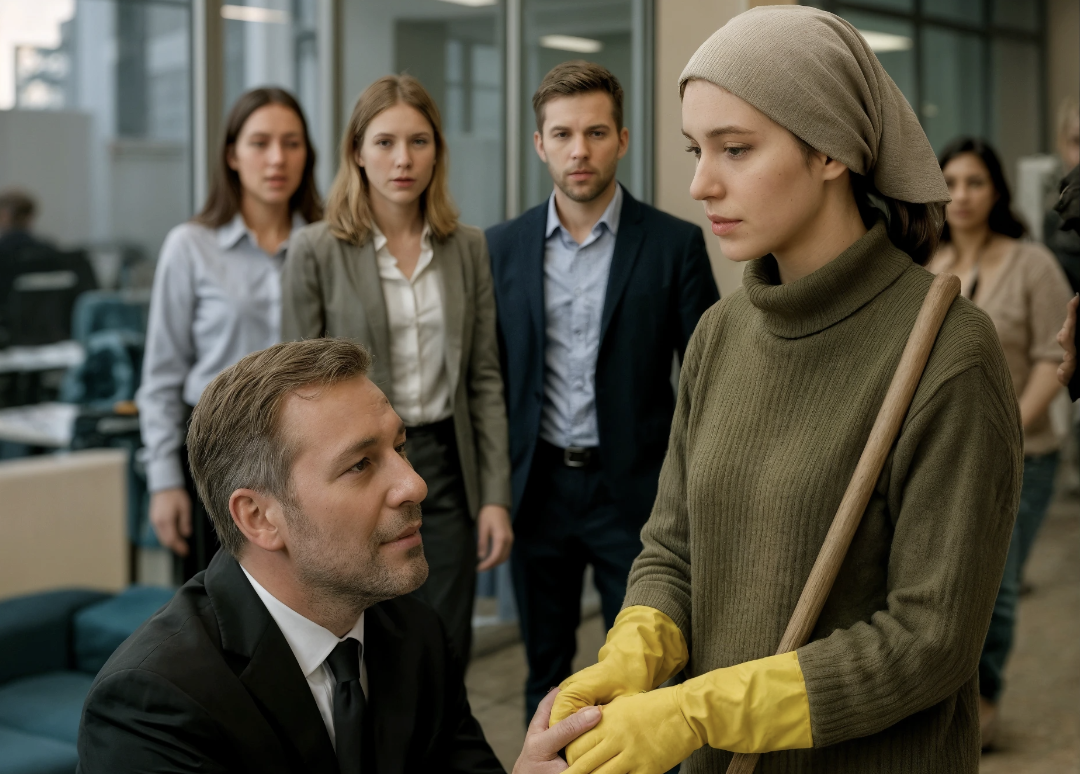She hadn’t spoken in three years — until he knelt in front of her.
For three months, no one at the bank knew her name. She didn’t chat, didn’t complain, didn’t even ask for help. She was simply… there.
A delicate figure, dressed in a turtleneck and a headscarf, gliding silently through the marble corridors of the bank, quietly wiping away the mess of the day. She polished the floors until they reflected every sliver of light, removed fingerprints from every metallic surface, and left behind a subtle scent of lemon and fresh air. When she finished, the bank sparkled — not with sterile cleanliness, but with a warmth that could be felt. You could tell she poured her heart into it.
Most employees ignored her. Some were cruel.
“Hey, mute girl!” a young loan officer sneered, mockingly pointing to a spotless corner. “You missed a spot.”
She would sigh softly, pick up her cloth, and continue. No words. No reaction.
Others whispered behind her back. “It’s creepy, how she never talks.” “Maybe she’s not all there.”
Still, she persisted. Silent. Diligent.
They called her Aleptina. At least, that’s what her name said on the payroll. Only a few actually used it.
No one asked where she came from, or what her story was. And she never offered to tell it.

What they didn’t know was that she once had a voice — a beautiful one — and a life full of promise.
Years ago, she had been known as Alia, a young teacher who loved children and adored painting. Her life was modest but full of light — until one night shattered everything.
It was a hot, stifling June evening. Alia had just finished a watercolor of a lilac bush when the smell of smoke filled her apartment. At first, she thought it was a careless neighbor burning something on the stove. But then screams echoed in the stairwell, and panic swirled with the growing cloud of smoke. A fire was raging in the apartment across from hers — home to a little boy named Lesha and his parents.
Without thinking, Alia grabbed her father’s toolbox and forced the door open. Flames licked the walls, the air choked with acrid smoke. Inside, she found Lesha and his mother, both unconscious. Trembling, she carried the child first, lungs burning, vision blurring, toward the window. The hallway was blocked by fire.
Outside, firefighters shouted for her to drop the boy into a rescue net.
Shaking, she lowered Lesha into the safe arms below. Then, overwhelmed by smoke and heat, she collapsed — pulled out at the last moment by two firefighters.
Lesha survived. His mother didn’t. Shortly afterward, his father disappeared.
Alia spent months in the hospital. Her back, arms, and shoulders bore horrific burn scars. The physical pain was immense — but worse was the silence that followed.
Soon after the fire, her mother passed away — her heart couldn’t bear the trauma and worry. That’s when Alia stopped speaking, seemingly for good.
Doctors called it psychological shock.
She resigned from her teaching post. Her world shrank to a small, quiet apartment, a fish tank, and her paints. Every night, she sat at her easel: sometimes painting light watercolors, sometimes dark oils. Her emotions poured onto the canvas, while her voice remained locked away.
In time, her father suggested she sell her apartment and find somewhere cheaper. She nodded silently.
Then she took a job as a cleaner. The burns still hurt, but she carried on. In the quiet of her voiceless days, she found unexpected peace. No one expected words from a janitor.
Her first job was at a small office, where her meticulous care caught the manager’s attention. When that office relocated, the manager recommended her to a friend who worked at a local bank.
That’s how Aleptina arrived — a voiceless woman whose heart was full of untold stories.
Three months passed.
Then, one morning, everything changed.
A hush fell over the bank. A luxury black car had pulled up outside. From it stepped a man in a tailored suit and dark sunglasses — Sergei Mikhailovich, the regional director.
He walked in with the confidence of someone used to commanding respect. The employees scrambled to stand straight and tidy themselves.
Aleptina didn’t look up. She was polishing the brass door handles, her yellow gloves gleaming under the fluorescent lights.
But when Sergei entered the room, his eyes landed on her — and stopped. His expression shifted. His pace slowed.
Without warning, he approached, knelt before her, and gently removed her gloves. The room froze.
Then, to everyone’s shock, he kissed her scarred hands.
Tears welled in Aleptina’s eyes.
“Alia,” he whispered, “I’ve been searching for you for years…”
Everyone watched, stunned. The mute cleaner — and the director?
But for Sergei, nothing else mattered.
“You saved my son,” he said, “you gave him life. And you gave mine back, too.”
The puzzle pieces clicked into place.
Lesha.
Sergei had never known the name of the woman who had pulled his son from the fire. After the tragedy, he had broken down with grief and guilt. He left everything behind, moved cities, tried to forget. But Lesha had never forgotten. And neither had he.
He had tried everything to find her, but her name never showed up. Just a young woman hospitalized — then vanished.
And here she was — silent, scarred, still bearing the weight of her grief.
“I owe you everything,” Sergei continued, voice trembling. “Come… with me.”
Aleptina — Alia — looked at him, stunned. Her lips quivered.
Then, for the first time in years, she spoke a single word.
“Lesha?”
Sergei nodded, tears streaming down his cheeks. “He’s studying to be a doctor. Just like you once dreamed of. He wants to help people — the way you helped him.”
Alia’s lips parted. The silence within her finally cracked.
In the weeks that followed, everything changed.
Sergei arranged medical and emotional treatment for Alia. Top surgeons volunteered their time. A psychologist gently guided her in reclaiming her voice and her confidence.
News of her heroism — the silent cleaner who had once saved a life — spread through the bank. Those who once mocked her now looked on with awe.
But Alia wasn’t seeking praise.
She asked for only one thing: “Let me paint.”
With Sergei’s help, she held her first art exhibition. Her paintings — delicate, luminous watercolors — moved viewers to tears. Each piece told a story she had never been able to speak.
She never went back to cleaning floors — not out of pride, but because she now had the freedom to live her truth.
She kept her headscarf — not to hide, but to honor the woman she once was. And when she spoke now, it was always with purpose.
One day, at an exhibition, a young man approached.
“Hello,” he said shyly. “I’m Lesha.”
Alia smiled, her eyes welling once more.
She reached out — and for the first time in nearly ten years, shook the hand of the boy she had saved from the flames.
In a world quick to judge by appearances, Alia reminded everyone of this truth: silence is not weakness. Scars are not shame. And some heroes wear no capes or medals — only a cleaning cloth, a paintbrush, and a heart full of love.







